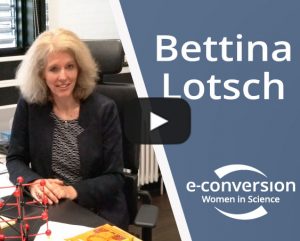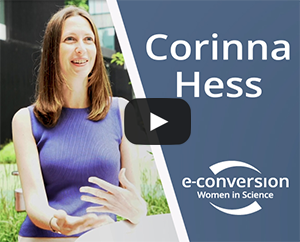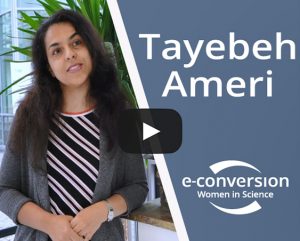
e-conversion supports scientists with children
(photo: Peter Sonntag, e-conversion)
Based on existing role models, strategies and concepts, e-conversion is committed to promoting diversity and equal opportunity. Due to the gender gap in science, we explicitly promote and help our female scientists in their career by offering them a variety of perspectives and targeted programs, e.g. mentoring for female scientists, networking events, career building and personal development.
We furthermore take on responsibility for the compatibility of family and science as well as work-life-balance. In addition, we want to prevent discrimination by breaking down unconscious bias. e-conversion aims at pursuing equal opportunity in respect of gender, family and all other types of diversity.
Diversity
At e-conversion, we are steadfast in our commitment to fostering an environment where diversity thrives and everyone is valued. Our mission extends beyond providing exceptional education; we aim to create a community that reflects our world’s rich tapestry of backgrounds, perspectives, and experiences. Central to this mission are our equal opportunity goals, designed to attract and support a vibrant mix of scientists. We believe that a supportive, inclusive, and family-friendly environment is not just beneficial but essential for the success and well-being of our community. We are dedicated to continuously expanding and improving our offerings to meet the evolving needs of our diverse members.
Diversity@TUM
Stabsstelle Diversity & Equal Opportunities – TUM Chancengleichheit
Women’s representatives@TUM
Diversity@LMU
Diversity Management – LMU München
Women’s representatives@LMU
Aktuelles – Universitätsfrauenbeauftragte – LMU München (uni-muenchen.de)
Women’s representatives@TUM
Diversity@Max Planck Gesellschaft
Family Friendliness
Family@e-conversion
- Laboratory Assistance
Excellent young female e-conversion scientists are supported during their pregnancy and/or upbringing of their children until the age of 6 (or in exceptional cases until the age of 7) by the employment of a laboratory assistant (max. 400,–€ per month). - Scholarship for childcare
Members of the e-conversion graduate program with children before entering elementary school can be supported with a scholarship for child care in order to continue their scientific work. This support includes the total or partly payment of a day nanny or a place in a day nursery (max. 400,–€ per month) and is subject to the family income. - Childcare during conferences and business trips
e-conversion scientists with children can apply for financial support for extraordinary child care during conferences and business trips. - Childcare on e-conversion conferences
e-conversion offers childcare free of charge during all e-conversion conferences and workshops. - Elternstammtisch
The Elternstammtisch (parent’s meeting) is a platform where young parents meet in order to discuss carrier topics, work-life-balance, childcare issues and simply to get to know each other.
For funding application forms please visit our download page.
Family@TUM
TUM Familienservice – TUM Chancengleichheit
Family@LMU
Mit Kind in der Wissenschaft – Universitätsfrauenbeauftragte – LMU München (uni-muenchen.de)
Sexual harassment
According to the United Nations, sexual harassment is defined as unwelcome sexual advances, requests for sexual favors, and other verbal or physical conduct of a sexual nature. In this context, unwelcome does not mean “involuntary”. A victim may consent or agree to certain conduct and actively participate in it even though it is offensive and objectionable. Therefore, verbal, non-verbal or physical sexual conduct is unwelcome whenever the person subjected to it considers it unwelcome.
Contact&help@TUM
Sexuelle Belästigung / Sexualisierte Gewalt – TUM Chancengleichheit
Contact&help@LMU
Sexuelle Belästigung – Universitätsfrauenbeauftragte – LMU München (uni-muenchen.de)
Women emergency call/Frauennotruf München
E-Mailberatung: Online-Beratung Frauennotruf München (beranet.info)
Inclusion
e-conversion is actively removing barriers to participation and success in academic and social aspects, enabling everyone to fully engage and contribute to the university community. E-conversion also takes care of the transformation of workplaces and laboratories to be able to include every scientist.
Inclusion@TUM
Inklusion – TUM Chancengleichheit
Inclusion@LMU
Antidiscrimination
Discrimination refers to the unjust or prejudicial treatment of different categories of people, especially based on race, age, sex, or disability. It involves actions or attitudes that disadvantage individuals or groups, denying them opportunities or rights based on aspects of their identity rather than their merits or abilities. Discrimination can manifest in various areas of life, including employment, education, and access to services, and can have profound personal and societal impacts.
Antidiscrimination@TUM
Links & Downloads – TUM Chancengleichheit
https://www.zv.tum.de/diversity/beratung-und-unterstuetzung/anlaufstellen/
Antidiscrimination@LMU
LGBTQ+
Queer@LMU
Queer-Referat – Konvent der Fachschaften – LMU München (uni-muenchen.de)
Queer@TUM
Referat für Diversity & Queer – Studentische Vertretung (tum.de)
Wissensportal LSBTI
Religion
You can seek advice from the Catholic and Protestant university community if you are looking for a neutral and trustworthy person who is not affiliated with the universities and is bound to confidentiality.
Catholic community@TUM
Protestant community@TUM
Moslem student initiative (Prayer rooms/Mosques)
Gebetsräume in München / Studieneinstieg | Muslimische Studenteninitiative
Jewish Student Union
Unconscious bias
Everybody does have unconscious or implicit biases. This means, we act and react on the basis of stereotypes and prejudice without intending to do so. Most of our unconscious biases derive from the general principles of the evolution theory. We pigeonhole our world based on experiences, in order to react quickly to new information. A Stereotype indicates an incomplete knowledge about a social group whereas a prejudice is characterized by personal emotions. This means when we believe in stereotypes they lead to prejudice and therefore sometimes to unconscious discrimination.
Test yourself!
Do you think you are not biased? Take an Implicit Association Test (IAT) and you will be surprised!
This test is a research project founded by Tony Greenwald (University of Wahington), Mahzarin Banaji (Harvard University) and Brian Nosek (University of Virginia). The test reveals implicit biases you don’t know you have. Unconscious bias can be hidden in our everyday actions. Have a look how the test and your brain work and what you can do to reduce these biases:
To the test: https://implicit.harvard.edu/implicit/takeatest.html
See how it works: https://www.youtube.com/watch?v=Z72MHd0y-bs
Here are some helpful publications concerning stereotypes in job advertisement or recommendation letter
UDK_Broschuere_Bias_web.pdf (udk-berlin.de)
libra_recruitment_guidelines_second_edition_0.pdf (eu-libra.eu)
The DFG released a short film “Unbiased Review” where you can see their guidelines:
Mitigating Bias in Scientific Evaluation and Decision-Making Processes (youtube.com)
Mothers in Science – 64 ways to have it all!
This promising statement is the title of a book published by the Royal Society. Its aim is to illustrate that it is perfectly possible to combine a successful and fulfilling career in research science with motherhood, and that there are no rules about how to do this. On each page you will find a timeline showing on one side, the career path of a research group leader in academic science, and on the other side, important events in her family life. Each contributor has also provided a brief text about their research and about how they have combined their career and family commitments.
Gendered Innovations
“Gendered Innovations harness the creative power of sex, gender, and intersectional analysis for innovation and discovery. Considering these approaches may add valuable dimensions to research. They may take research in new directions.” explain Londa Schiebinger, Professor of History of Science at Stanford University on her website. The scientist launched the project of the same name and has developed practical methods of gender analysis for STEM and shows examples of how gender leads to discovery and innovations.
At this TEDx-Talk, Londa Schiebinger presents their surprising findings: https://www.youtube.com/watch?v=JaYzdz9X3n4
Video Series:
Women in Science
Women in Science
Quick link
Contact
Silke Mayerl-Kink
TU München
Lichtenbergstr. 4a
85748 Garching
Phone: +49 (0)89 289 52778
Contact
Silke Mayerl-Kink
TU München
Lichtenbergstr. 4a
85748 Garching
Phone: +49 (0)89 289 52778



